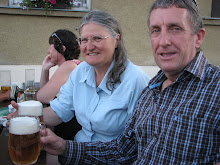We came down from the hills into the Bekaa Valley and dropped people off at the towns in the valley. The slopes were covered with many small grape vines and fruit trees. An ancient grape grows well in this area and apparently makes good wine. We have not seen any shops that sell wine or, any alcohol for that matter.
We arrived late afternoon in Baalbek and found the first hotel we visited too cold and lacking any kind of heating. The wind was blowing off the snow on the hills above the city so it was important to find a warm place. Eventually we settled on a pension overlooking a narrow main street. It was spotless and had a heater in the middle of the room that had a flue which crossed from one side of the room to the other, over the top of the hanging lights, and out a hole in the wall where it bellowed the black diesel soot outside. The manager told us that he only had generator electricity from 6pm to 12am but the rest of the rest of the day he had mains electricity to heat the hot water. There was a huge lounge with a well decorated diesel heater too and a balcony that got the sun so we could wash and dry our clothes.

Baalbek is famous for its ruins and is another World Heritage site. It is also the home to Hezbollah (Party of God). The Phoenicians named the city Baal after the sun god. The Greeks called it Heliopolis, City of the Sun, and the Romans made it a worship place for their god Jupiter.
The ruins are quite grand. There are temples to Venus and Bacchus as well as a huge court, altars and baths. The entrance fee is expensive and although there are information boards on the site many of them have been damaged and are useless.

The museum, with a few relics, is underground and was freezing cold at this time of the year. Parts of the complex had been turned into a mosque as well. It was interesting to learn that many Roman structures took centuries to build so many were never completed and there are some pillars where the outline has been chiselled and the detail work was never finished.

Just out of the town is a huge spring where the Romans got water. It is now surrounded by vans decked out to sell coffee and hire out hubbly bubbly pipes. The spring is littered with plastic coffee cups and other rubbish that the goldfish swim around. Ducks have made nests on the Roman ruins in the centre of the pond too.

There is a beautifully tiled mosque at the entrance to the city. The handmade tiles have patterns as well as Arabic script on them.
We read that the town used to export ice to Egypt!

There is not a lot to do here but we have enjoyed being out of the bustling large cities and walk about looking at the locals as they carry on with their daily life. We have a backgammon set that our friend Gerti gave us for Christmas and John keeps beating me at that. We exchanged books at a hotel in Damascus and have been sitting in the sun doing some reading and genrally relaxing as the next month will be quite hectic when our daughter will join us.
We have just had news that John's mum, aged 95, has had a small stroke so we are keeping in touch with family who are taking care of her and letting us know how she is doing.
